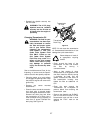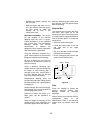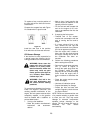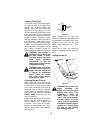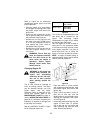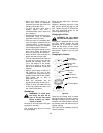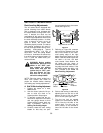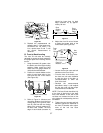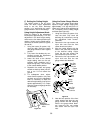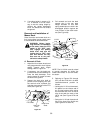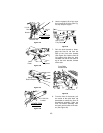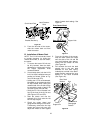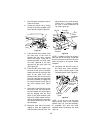
35
WARNING: Operating the
engine with loose or dam-
aged air cleaner components
will allow unfiltered air into
the carburetor, causing ex-
tensive wear and eventual
failure of the engine.
Servicing The Precleaner
Wash and re-oil the foam precleaner
more often under extremely dusty or
dirty conditions. See Figure 26.
• Loosen the aircleaner cover knob
and remove the cover.
• Remove the foam precleaner by
sliding it up off the paper element.
• Wash the precleaner in warm water
with detergent. Rinse the precleaner
thoroughly until all traces of the
detergent are eliminated. Squeeze
out (do not wring) excess water in a
dry cloth. Allow the precleaner to air
dry.
• Saturate the foam precleaner with
new engine oil. Squeeze out all
excess oil in a dry cloth.
• Reinstall the foam precleaner over
the paper element.
• Reinstall the air cleaner cover and
tighten the retaining knob to secure.
Servicing The Paper Element
Inspect and replace the paper element
as necessary. See Figure 26.
• Loosen the air cleaner cover knob
and remove the cover.
• Remove the foam precleaner by
sliding it up off the paper element.
• Clean the area around the element
to prevent debris from getting into
the engine when the element is
removed.
• Loosen and remove the element
cover wing nut.
• Remove the air filter element and
element cover by lifting straight up.
• Do not wash the paper element or
use pressurized air, as this will
damage the element. Replace a
dirty, bent or damaged element.
Handle new elements carefully; do
not use if the sealing surfaces are
bent or damaged.
• When servicing the air cleaner,
check the air cleaner base. Make
sure it is secured and not bent or
damaged. Check the element cover
plate for damage or improper fit.
Also check the rubber seal for
damage or deterioration. Replace all
damaged air cleaner components.
• Reinstall the paper element, foam
precleaner, cover plate and element
cover wing nut.
• Reinstall the air cleaner cover and
tighten the retaining knob to secure.
IMPORTANT: Properly maintained air
cleaner elements significantly
contribute to prolonging engine life.



